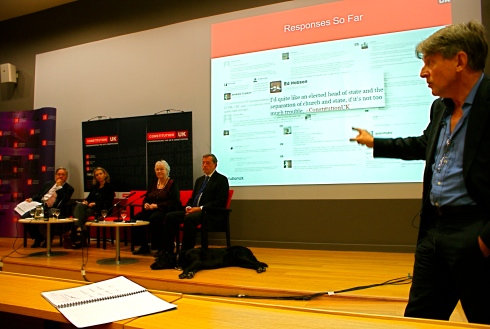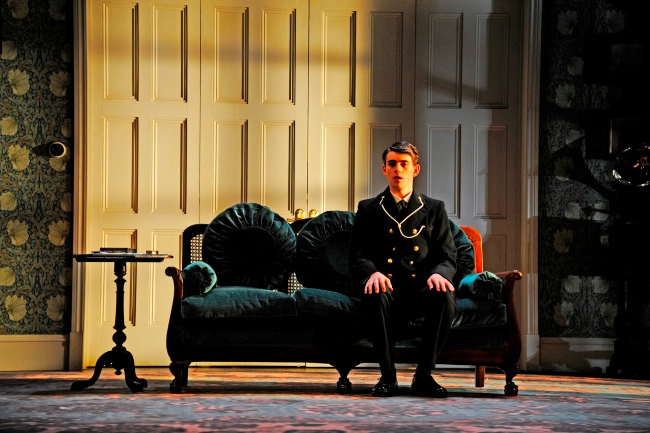The inaugural European Games in Baku is round the corner and the spotlight has been focusing on Azerbaijan’s poor human rights record, with a number of high profile human rights defenders still detained within the prison system. Ramute Remezaite, one of the legal representatives of detained lawyers Intigam Aliyev and Rasul Jafarov, has written this guest post on their case and the situation in Azerbaijan.
Rasul Jafarov after a court hearing at the Baku Grave Crimes Court.
Azerbaijan is experiencing perhaps the worst human rights crackdown since its independence. With the escalation in summer 2014, the unprecedented repression on civil society has resulted in key human rights defenders, journalists and activists behind bars under bogus charges, de facto closure of dozens of critical human rights NGOs, and a series of overly restrictive amendments to NGO laws in the last couple of years. With the shrinking space for independent groups, the very existence of Azerbaijani civil society is at great risk.
For Intigam Aliyev and Rasul Jafarov, two prominent lawyers, human rights defenders and NGO leaders, the repression has now been moved to a courtroom. In April 2015, Aliyev and Jafarov were sentenced to 7½ and 6½ years respectively in prison under the charges of illegal entrepreneurship, tax evasion, abuse of power, misappropriation and forgery.
Intigam Aliyev is an experienced human rights lawyer and President of the Legal Education Society, who successfully litigated cases against Azerbaijan in the European Court of Human Rights for many years.
Rasul Jafarov is a prominent human rights defender and Chairman of the Human Rights Club, well known for his wide reaching human rights campaigns ‘Sing for Democracy’ and ‘Art for Democracy’, and for compiling a comprehensive list of political prisoners in Azerbaijan.
Both activists are also well known for their active engagement with the Council of Europe, OSCE and the UN human rights bodies advocating for the improvement of the human rights situation in Azerbaijan.
Despite the wide attendance of representatives of foreign embassies in Baku, domestic and international observers, civil society members and the media during their court hearings, neither faced a fair trial.
During the first two hearings, both Aliyev and Jafarov were handcuffed in a cage, which not only prevented them from communicating with their lawyers during the trial, but also violated the presumption of innocence, imposing that both activists be treated as criminals. The European Court of Human Rights (ECtHR) has also recognised this as amounting to degrading treatment of detainees.

Intigam Aliyev held in a cage during a court hearing.
The proceedings resulted in gross violations of the principle of equality of arms. The Nasimi District Court only examined the evidence provided by the prosecution, dismissing all argumentation and evidence provided by the defendants. In both cases, the court dismissed requests by the defence to invite additional witnesses, who held relevant information as evidence for the examination of the cases.
In the case of Rasul Jafarov, all five alleged victims involved in the case insisted they did not have any claims against the activist and requested the domestic court to lift their status as victims. The Nasimi District Court ignored such requests and used it as evidence against Jafarov, claiming that the signatures on payment slips to alleged victims were forged. It further dismissed the results of independent forensic expertise conducted abroad concluding the authenticity of signatures of two alleged victims.
In both cases, clear violations of the burden of proof, an important component of presumption of innocence, were found. For example, the court claimed that Jafarov was guilty with misappropriation of funds as he allegedly failed to provide evidence documenting the spending of funds. In Aliyev’s case, the prosecution claimed that he failed to acquire registration for foreign grants received before such a requirement entered into force.
Both activists appealed to the Baku Appeal Court but do not expect any justice brought in domestic courts, and plan to appeal to the ECtHR. Their cases challenging the legality of the pre-trial detention have already been communicated to the government of Azerbaijan by the ECtHR under priority rule.
This is a guest post written by Ramute Remezaite and may not reflect the views of Fair Trials.
Ramute Remezaite is a human rights lawyer, PhD Candidate at the School of Law of Middlesex University and one of the legal representatives of Rasul Jafarov and Intigam Aliyev before the ECtHR.
Image credit Ferqane Novruzova.
For regular updates follow Fair Trials on Twitter or sign-up to our monthly bulletin at the bottom of the page.
The post Guest Post: Human rights defenders in Azerbaijan unable to receive a fair trial appeared first on FairTrials.org.
















